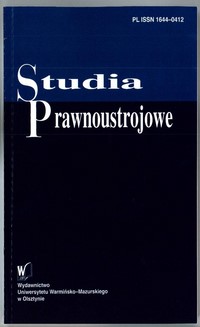Searching for the best legal interpretation and the ideal formula of a state – Otto von Gierke and corporatism as the basis for a new federal state
Searching for the best legal interpretation and the ideal formula of a state – Otto von Gierke and corporatism as the basis for a new federal state
Author(s): Edyta SokalskaSubject(s): History of Law, Philosophy of Law, Comparative Law
Published by: Wydawnictwo Uniwersytetu Warmińsko-Mazurskiego w Olsztynie
Keywords: legal theory; legal method; German jurisprudence; codification; federalism;
Summary/Abstract: The introduction of the Napoleonic Code in France created in Germany a similar desire for a civil code, which would systematize and unify the various and heterogeneous laws. The German code Bürgerliches Gesetzbuch (1896) was developed during the period of social stability and gradual political consolidation. The purpose of the article is to present the main scientific positions on the method of interpretation of law which appeared in German jurisprudence in the 19th and the first half of the 20th century, particularly the historical school of law and the contribution of Otto von Gierke (one of its leaders) to the discourse on the legal method and interpretation of legal acts, and his idea of corporatism. In Germany, it was approved that some patterns for legislation might be drawn from the experience of previous generations, from history, particularly (in the perception of Friedrich Carl von Savigny) from the Roman law. Active at the turn of the 19th and 20th centuries, Otto von Gierke presented an elaborate concept of corporatism based on legal, historical, and social studies. According to the scholar, corporations will be crucial to the development of a modern federal state. Gierke’s ideas enjoyed considerable popularity with American progressivists.
Journal: Studia Prawnoustrojowe
- Issue Year: 2022
- Issue No: 56
- Page Range: 265-279
- Page Count: 16
- Language: English

